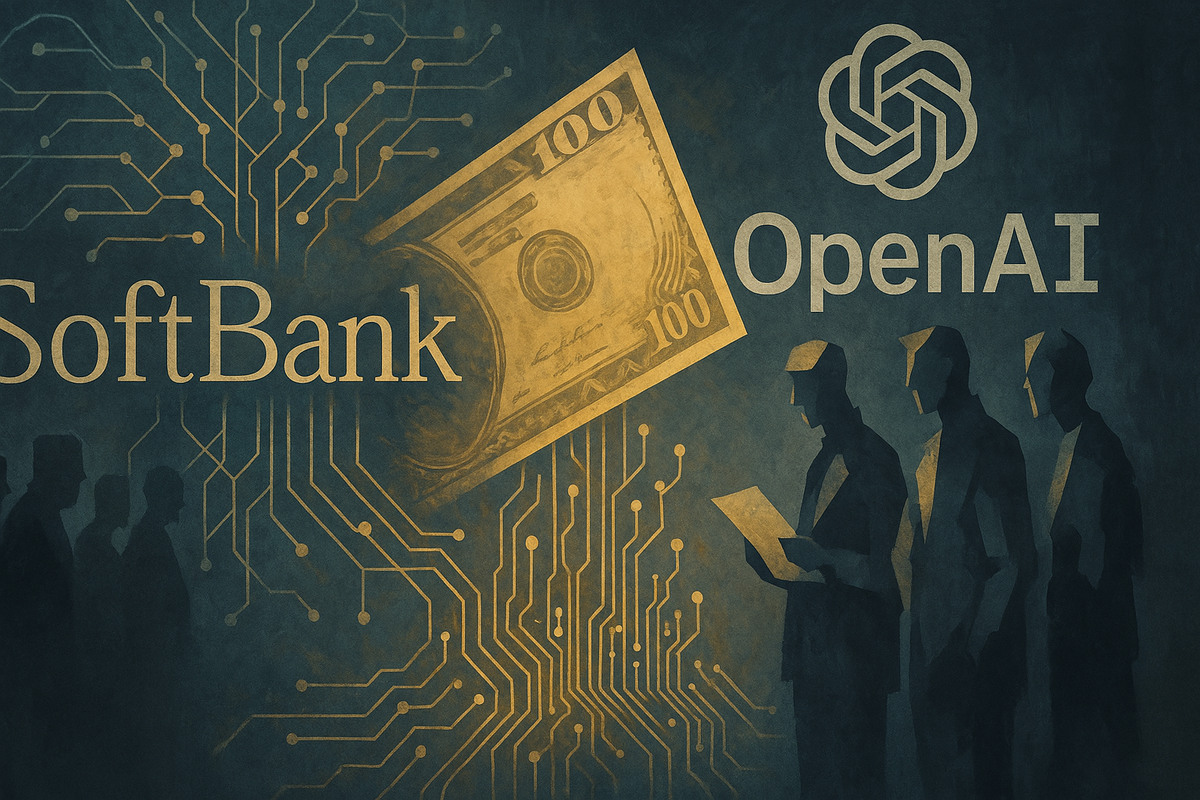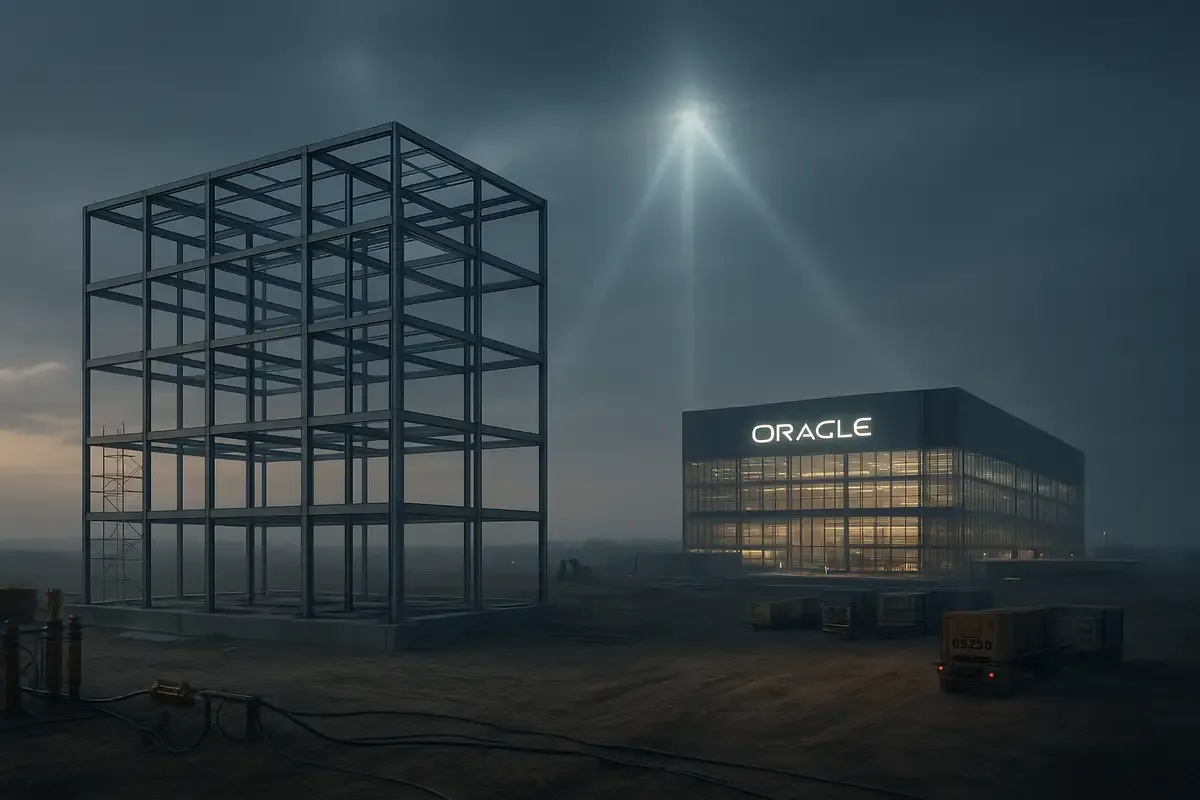💡 TL;DR - The 30 Seconds Version
🚨 SoftBank and OpenAI's $500 billion Stargate project announced at the White House in January has completed zero data center deals six months later.
💰 SoftBank invested $30 billion in OpenAI (largest startup investment ever) but got sidelined when OpenAI signed a separate $30 billion annual Oracle deal.
🏗️ Instead of the promised immediate $100 billion deployment, Stargate scaled back to building one small data center in Ohio by year-end.
⚡ OpenAI's Oracle partnership delivers 4.5 gigawatts of capacity using 2 million AI chips - consuming power equivalent to four million homes.
🎯 The partnership breakdown shows OpenAI needs computing power faster than joint ventures can deliver as it scales from 1 million to 100 million GPUs.
🌍 This pattern could reshape how AI companies build infrastructure - choosing direct vendor deals over complex partnership structures.
Six months ago, Masayoshi Son stood in the White House next to Sam Altman and Donald Trump, promising to spend $500 billion on AI infrastructure. The Stargate project would transform America's artificial intelligence capabilities with massive data centers across the country. They'd invest $100 billion "immediately," they said.
Today, that partnership looks more like expensive theater. The Wall Street Journal reports that Stargate hasn't completed a single data center deal. Instead of the promised immediate deployment, the companies have scaled back to building one small facility in Ohio by year's end.
Meanwhile, OpenAI has quietly moved ahead without its supposed partner. The ChatGPT maker signed a separate deal with Oracle worth more than $30 billion annually for 4.5 gigawatts of data center capacity. That's nearly as much as Stargate promised for its entire first year.
The $30 Billion Bet Gone Wrong
Son's SoftBank made the largest startup investment in history when it put $30 billion into OpenAI earlier this year. The move was supposed to give SoftBank a seat at the AI infrastructure table alongside the partnership announcement. Instead, it appears Son bought himself an expensive ticket to watch from the sidelines.
The two companies have been feuding over basic terms of their partnership, including where to build data centers. SoftBank wanted to focus on sites tied to its energy subsidiary, SB Energy. OpenAI had other ideas.
Their joint statement insists everything is fine, claiming they're "moving at hyperscale and speed." But actions tell a different story. Altman has been cutting deals with other data center operators while the Stargate partnership remains stuck in planning mode.
Oracle Steps Into the Void
OpenAI's Oracle deal tells you everything about where this is heading. The agreement calls for 4.5 gigawatts of capacity spread across multiple US locations, consuming enough power to run four million homes. That's more than two Hoover Dams worth of electricity.
The partnership will use more than two million AI chips and create over 100,000 jobs, according to OpenAI. None of this involves SoftBank, despite the Japanese conglomerate being positioned as Stargate's co-leader and financier.
Oracle began delivering its first racks of Nvidia GB200 chips last month to OpenAI's Abilene, Texas facility. Parts of that data center are already running OpenAI's workloads. Meanwhile, the broader Stargate project remains on paper.
The GPU Arms Race
Altman's appetite for computing power helps explain the urgency. The OpenAI CEO recently said his company needs to scale from one million GPUs to 100 million. That expansion could cost $3 trillion, according to industry estimates.
OpenAI has complained that Microsoft can't meet its cloud computing demands under their existing partnership. The company warned that a rival might achieve artificial general intelligence first if Microsoft doesn't step up its infrastructure game.
This resource hunger drove OpenAI to the Stargate announcement in January. But when that partnership stalled, Altman kept looking for alternatives. Oracle provided one. Other deals with companies like CoreWeave filled additional gaps.
SoftBank's AI Ambitions Stumble Again
Son has spent years trying to position himself as a major AI player. His Vision Fund invested over $140 billion in startups over the past decade, searching for the next breakthrough companies. Instead, he missed OpenAI and its competitors before ChatGPT launched, while backing expensive failures like WeWork and Katerra.
The SoftBank chief had better luck with his 2016 purchase of chip designer Arm, which surged in value during the AI boom. But his OpenAI investment was supposed to be his big AI moment. Now that looks questionable.
Son reportedly wants to invest even more in OpenAI, according to people familiar with the matter. Whether Altman wants more of SoftBank's money while cutting the company out of infrastructure deals remains unclear.
The Infrastructure Reality Check
Building AI data centers isn't just about money. Companies need to find suitable sites, develop physical structures, buy expensive AI chips, source massive amounts of electricity, and arrange financing. Each step takes time and expertise.
Stargate planned to use a new, lower-cost design for its first Ohio project. But even with simplified construction, the partners couldn't agree on basic terms six months after their White House announcement.
Trump has made AI infrastructure a national priority, declaring an energy emergency to remove regulatory obstacles to power generation. The administration wants to beat China in the AI race, making projects like Stargate politically important.
What Comes Next
OpenAI's separate Oracle deal gives it the computing capacity it needs for now. The company expects to exceed its original Stargate commitments through this partnership and others. SoftBank's role in that future remains murky.
The Japanese company still holds its massive OpenAI stake and maintains chairman rights to whatever Stargate eventually becomes. But Altman has shown he won't wait for partnership disputes to resolve when AI development moves this fast.
Oracle CEO Safra Catz summed up the situation during an investor call last month: "Stargate is not formed yet." That might be the most honest assessment of where things stand.
Why this matters:
• SoftBank's $30 billion bet on AI leadership is looking like an expensive lesson in Silicon Valley partnership dynamics
• OpenAI has proven it can build massive AI infrastructure without waiting for complicated joint ventures, setting a template other AI companies will likely follow
❓ Frequently Asked Questions
Q: How much electricity does 4.5 gigawatts actually use?
A: OpenAI's Oracle data centers will consume more power than two Hoover Dams combined - enough electricity for about four million American homes. That's roughly equivalent to powering the entire state of Oregon.
Q: Why does AI training need so much computing power?
A: Each new AI model requires exponentially more processing power. OpenAI wants to scale from 1 million to 100 million GPUs, which could cost $3 trillion. Training advanced models processes massive datasets through billions of calculations simultaneously.
Q: What happened to Oracle and MGX in the original Stargate announcement?
A: Oracle became OpenAI's direct partner outside Stargate, while MGX's role remained unclear from the start. Oracle CEO Safra Catz admitted in May that "Stargate is not formed yet," suggesting no formal agreements existed.
Q: How long do data centers typically take to build?
A: Standard data centers take 18-24 months from groundbreaking to operation. OpenAI's Abilene facility began construction this year and parts are already running. The complexity comes from securing sites, power contracts, and specialized AI chips.
Q: What's SoftBank's track record with major tech investments?
A: Mixed results. SoftBank's Vision Fund invested over $140 billion in startups but missed OpenAI and other AI leaders while backing failures like WeWork and Katerra. Its 2016 Arm acquisition performed well during the recent AI boom.
Q: Why can't OpenAI just use existing cloud providers like Amazon or Google?
A: Scale and control. OpenAI already complained that Microsoft can't meet its computing demands. Building dedicated facilities gives OpenAI guaranteed access to cutting-edge AI chips and eliminates dependency on competitors who run their own AI models.
Q: How does OpenAI's $30 billion annual Oracle deal compare to its revenue?
A: The Oracle commitment is roughly three times OpenAI's recent projected annual revenue. The company loses billions yearly but bets its revenue will multiply as paying customers grow and advertising revenue kicks in.
Q: Will other AI companies follow OpenAI's direct partnership approach?
A: Likely yes. The Stargate delays show complex joint ventures can't match the speed AI development demands. Direct vendor relationships offer faster deployment, clearer terms, and fewer partnership disputes that slow progress.













